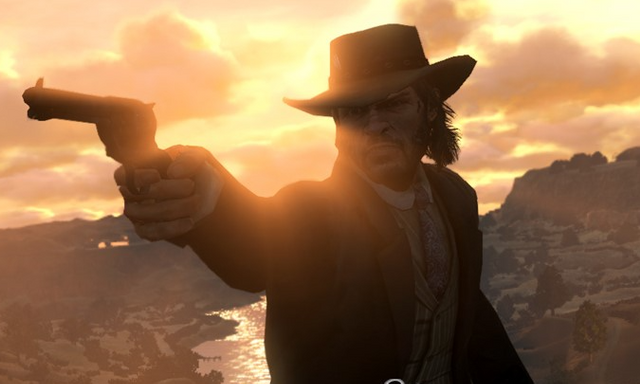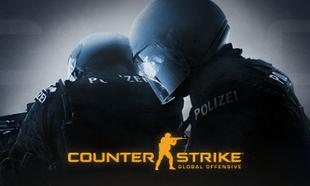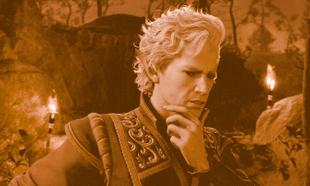Our website is turning 25 years old this year and we're revisiting the 25 biggest games of our lifetime; we started the series with 1999's 'Metal Gear Solid' and today we're swapping espionage for cowboys - it's 2010's 'Red Dead Redemption'
If the first 3 years of the PlayStation 3 and Xbox 360 generation could be defined by one word, it's "cover".
Ever since 'Gears Of War' changed the third-person shooter with a cover-based system, developers were keen to make players spend long stretches of games hunkered next to a piece of concrete.
2008's 'Grand Theft Auto 4' offered players the chance to explore a digital version of New York City by car, boat or air, but Rockstar Games' follow-up offered true freedom unlike anything seen in a video game before.
If the 'Grand Theft Auto 4' map was smaller but more detailed, 'Red Dead Redemption' was the opposite; sprawling and sparse.
If the early part of the 7th console generation had players hiding behind a wall, the revolution led by 'Red Dead Redemption' let players stretch their legs.
Solitude in the plains
The desert and its surroundings have always made for striking cinema, from the John Ford era all the way up to 2021's Academy Award For Best Picture 'Nomadland' but the serenity of the desert has rarely been captured in video game form.
In between the duels, train robberies and fleeing from federal agents, the vast majority of 'Red Dead Redemption' is spent on horseback taking in the surroundings.
Whereas in 'Grand Theft Auto 4' you could turn on a classic rock radio station or an indie station on your commute to missions, no such feature exists in 'Red Dead Redemption'.
This was a necessity borne out of the game's setting taking place in the early 20th century, but the trade-off for this was letting players get familiar with the games peerless sound design and twang-heavy musical score.
Hearing the Morricone-style sting kick in as you mosey into the nearest town never gets old, and the game serves as your own personal western film.
'Red Dead Redemption' tells the story of John Martson, an outlaw forced to carry out the dirty work of the federal government.
The federal government has taken away Martson's family and won't get to see them again unless he helps them track down members of his old gang.
As far as western plots go it's fairly by-the-book, the "one last job" trope we see in countless forms of media, but how 'Red Dead Redemption' puts a twist on the familiar story is by making John Martson a character you'd love to meet and end up caring deeply for.
He's surly, prone to temperamental outbursts, is only loyal to himself and treats every job as a means to an end, yet by the end of the game, his death at the hands of the very federal agents he reluctantly trusted comes as a gut punch like no other in gaming.
Rob Wiethoff's vocal performance as Martson does a lot to endear the player to John Martson, existing somewhere between John Wayne and Billy Ray Cyrus.
In the games lighter moments, his dead serious, no-nonsense exterior pairs surprisingly well with the more eccentric characters.
The aptly-named Irish character "Irish" serves as great comic foil to the dour cowboys surrounding him.
'Red Dead Redemption' captures a moment in world history beautifully, and populates it with some fascinating characters that all have their own hopes, dreams and ambitions.
South Of The Border
When people talk about 'Red Dead Redemption' one moment springs to mind: the bit where you enter Mexico for the first time.
After holding off waves of enemies on a rickety barge, the player is then free to explore the deserts of Northern Mexico.
Rockstar's trademark for playing licensed music at just the right time is at its sparkling best here, as José González' "Far Away" kicks in as the Mexican wilderness reveals itself to the player.
José González helped sell millions of Sony TV's in 2005 when his song "Heartbeats" was used to advertise the Sony Bravia television, and Rockstar made lightning strike twice by including his gorgeous music at a choice moment.
When the game makes its foray into Mexico, the story takes on a political bent, with the player playing a part in the real-life Mexican revolution.
Seeing Martson getting mixed up in political intrigue in a nation he's not that terribly familiar with adds another layer of depth and complexity to the game, and portrays the revolution with nuance.
Martson's role in the revolution is similar to Han Solo in 'Star Wars' in that he doesn't really care about the cause but will do anything to benefit his own end, and ultimately ends up caring for the revolution and what it stands for.
Rockstar's approach to politics has always taken the 'South Park' style "both sides are bad" approach, but in 'Red Dead Redemption', they portray a real-life historical event with tact and grace.
Like A Rhinestone Cowboy
One of the great advantages of playing video games is that length is not an issue.
A game like 'Red Dead Redemption' tackles themes like revenge, atonement, political upheaval, loss, greed, racism, and American Exceptionalism, and you'd be hard-pressed to find a film that could fit all those themes into a 2-hour runtime and give them all room to breath.
Last year, my colleague Brian wrote about the Irish cultural fascination with the western film, and to Irish people in particular, the Wild West has always been a romantic idea.
Perhaps it's our own nation's history of travelling around the world for work and the idea of going to the United States after the famine and trying to make your own luck that attracts us to media set in the Wild West.
On the big screen, the likes of Kevin Costner, Kurt Russell, John Wayne, Gary Cooper, Lee Van Cleef and Clint Eastwood paint the Wild West as a time of the man with a jawline that could cut glass, but what 'Red Dead Redemption' does best is subverting the tropes.
At the very end of the game, after slaying all those gang members and jumping through all those hoops for the American government, you die at their hands anyway.
To quote Alan Rickman in 'Die Hard', "This time John Wayne does not walk off into the sunset with Grace Kelly."
(That was Gary Cooper, asshole!)
The tragic demise of John Martson ranks with one of gaming's all-time great gut punches.
By that stage of the game, John Martson has been reunited with his family, he has carried out his revenge against his old gang, and looks set to settle down.
The game makes you think he has a chance of seeing off the federal agents - after all, John has survived bigger battles before.
Dead Eye activates, you get a few shots off giving players the brief belief that they can survive, when the salvo of rifle shots riddle John's body.
As far as endings go, it is up there with the ending of 'Life On Mars' or the ending of 'There Will Be Blood' - a last-minute cathartic rush that leaves you wanting more and is utterly, truly devastating.
Into The Sunset
Rockstar San Diego followed up the core game with the 'Undead Nightmare' DLC later in 2010 by adding surprisingly brilliant zombie DLC to the mix.
It should be noted that the game was developed by Rockstar San Diego, a smaller studio within the larger Rockstar network.
2018's 'Red Dead Redemption 2' is regarded as one of the defining games of the 8th console generation, but its legacy has been complicated.
The Rockstar Games of 2022 is a very different developer to the one that put out the original 'Red Dead Redemption'.
Rockstar San Diego worked on 'Red Dead Redemption 2' but it was as part of the larger Rockstar network of developers and allegations of morally dubious work practices on the games have become industry cautionary tales.
The original 'Red Dead Redemption' was a passion project for Rockstar San Diego and was developed without the expectation of the game becoming a landmark title in the history of video games or a blockbuster hit.
'Red Dead Redemption 2' struggles and labours to do what the original did flawlessly.
The sequel has the kitchen sink thrown at it, with every single element tutorialised within an inch of its life, the pacing is often ground to a halt to make players take in the digital landscape that took a lot of blood, sweat and tears to make, and in general, the game has the air of bending over backwards to please the player.
A lot was made pre-release of horses' testicles shrinking because of the cold in-game, but with all that effort put into something very few players would notice, they forgot to make the gameplay fun.
The original 'Red Dead Redemption' didn't need any of those bells and whistles.
All it needed was a surly cowboy, an acoustic guitar, and a horse.













































































